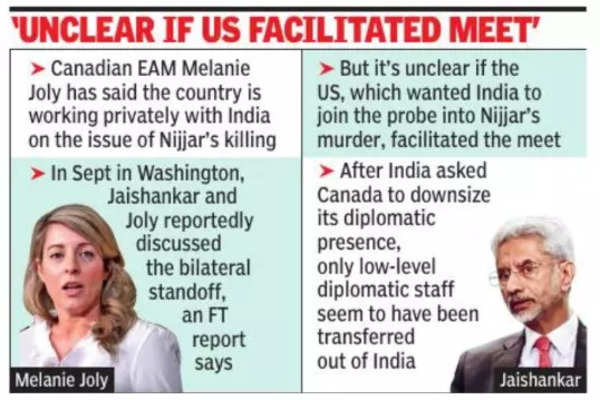The downsizing of Canada’s missions in India is not yet complete as both countries are still discussing the modalities of the exercise and Ottawa appears uninterested in ensuring the parity in diplomatic presence sought by New Delhi. The Indian government on Wednesday did not deny reports from Canada that some of its diplomats may have overstayed, despite New Delhi threatening to lift their diplomatic immunity.
A Financial Times report from Washington also quoted sources as saying that Foreign Minister S. Jaishankar had a “secret” meeting with his counterpart Melanie Joly in the US capital last month to discuss the standoff over the killing of the pro-Khalist To discuss terrorists Hardeep Singh Nijjar According to Canadian claims, India played a role in this. The State Department declined to comment on the report.
While the US has stated numerous times that it wants India to join the Canadian investigation into the murder, it is unclear whether it also facilitated the meeting, assuming the meeting between Jaishankar and Joly actually took place.
Watch: EAM Jaishankar’s point-blank refutation of Canadian Prime Minister Justin Trudeau’s Nijjar killing allegations
Significantly, Canadian Prime Minister Justin Trudeau further aggravated the Khalistan issue between India and Canada by raising it in telephone conversations with leaders of the United Arab Emirates and Jordan meant to address the Israel-Hamas war.
Canada uses meetings with others to put pressure on India
While Joly said Canada is working privately with India on the Nijjar issue, Canada is using its bilateral contacts with other countries to pressure India to facilitate investigations into the murder.
Canadian media had previously reported that a majority of the country’s diplomats in India had been transferred to Singapore and Malaysia, but recent reports citing anonymous officials appear to indicate that only low-level diplomatic staff were transferred. In fact, the FT report quoted a Canadian official as saying that Canada had not withdrawn a diplomat before the October 10 deadline. Significantly, India never officially confirmed that such a deadline even existed.
India has a lot to say: S. Jaishankar’s full speech at the UN
Canada has a stronger diplomatic presence in India, largely due to its large consular department, which processes visas for family members and relatives of 1.3 million Canadians of Indian origin. After Trudeau claimed that there were “credible allegations” about India’s role in the killing of Nijjar, India had called on Canada to ensure a parity of diplomatic presence while claiming that Canadian diplomats were involved in anti-India activities. However, the FT report said Canada rejected India’s argument that the Vienna Convention on Diplomatic Relations justified its demand for parity.
The report quoted Peter Boehm, chairman of the Canadian Senate’s Foreign Affairs Committee, as saying that there was nothing in the treaty that referred to parity or unilateral determination of the number of diplomats.

















